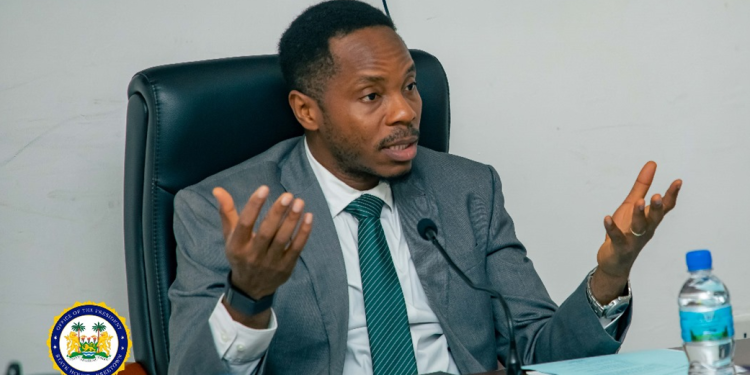By Mackie M. Jalloh
In a dramatic turn of events, the integrity of Sierra Leone’s flagship Free Education project under President Julius Maada Bio’s administration has been called into question. The initiative, once heralded as a transformative program for the nation’s educational system, is now mired in allegations of corruption, nepotism, and gross mismanagement, threatening the very future of millions of Sierra Leonean children.
The controversy centers on the procurement processes for critical components of the project, particularly the acquisition of solar-powered tablets intended to benefit 6,061 schools across the country. Despite receiving the World Bank’s approval to proceed with the contract, the process has been stalled by internal disputes. Reports suggest that Mr. Mohamed Kallon, a procurement specialist, and Mr. Ambrose T. Sesay, the project coordinator, have disregarded proper procedures, pushing for the testing of a device not provided by the winning bidder. This manoeuvre has sparked widespread concern, with accusations that their actions may be driven by ulterior motives rather than the best interests of the project.
Further complicating matters, the involvement of Mr. Sesay, who is allegedly related to the Chief Minister, has cast a shadow of nepotism over the project. This relationship has intensified scrutiny, with critics alleging that the project’s delays are a direct result of personal interests overriding public duty.
The World Bank, a significant partner in the Free Education project, has not been silent on the matter. It has voiced serious concerns about the management of other related initiatives, such as the construction of student hostels in Pujehun, Kailahun, and Bonthe. Originally intended to provide safe accommodation for students from remote areas, these hostels have been deemed “not fit for purpose,” raising alarms about the safety and welfare of the students they were meant to protect.
The procurement issues extend beyond the tablets and hostels. A legal dispute has stalled the acquisition of high-quality printers and toners for the teachers’ licensing program, further delaying the project’s rollout. Allegations have surfaced that the contract was unlawfully awarded to a company that did not participate in the bidding process, throwing the entire procurement process into disrepute.
Primary schools are also suffering due to these procurement mishaps. Teaching and learning materials for Primary One students, crucial for the upcoming school term, have not been delivered. In a desperate move to mitigate the situation, the Teaching Service Commission (TSC) has resorted to printing teacher’s guides in black and white. However, this stopgap measure is insufficient, and the delay in delivering these essential resources threatens to severely compromise the education of thousands of young students.
As the Free Education project teeters on the brink of collapse, the nation watches closely. The unfolding scandal not only jeopardizes the future of Sierra Leone’s children but also casts a long shadow over President Bio’s legacy. The call for transparency and accountability has never been more urgent, as the true cost of these procurement failures begins to surface.













